牛津英语上海版级上学期知识点罗列
牛津上海版初中英语各单元知识点
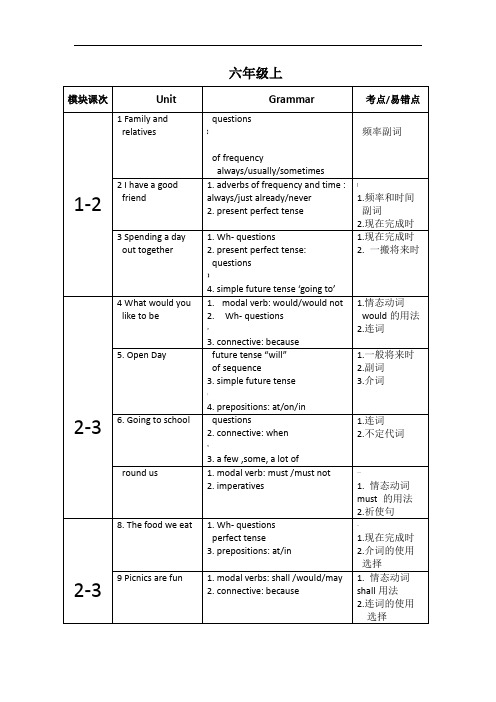
六年级上
;
重点:介词:at, on, in,情态动词:would, must, shall,一般将来时,现在完成时,不定代词:a few, some, a lot of
六年级(下)
一.共分为11个单元,各单元内容为:
六年级下
重点:情态动词用于情景交际,介词:for, if, with, from,there be句型,一般将来时。
七年级(上)
一.共分为11个单元,各单元内容为:
七年级上
;
重点:祈使句,方位介词,副词,现在完成时,so/neither句型
七年级(下)
一.共分为11个单元,各单元内容为:
七年级下
重点:介词的使用,代词:物主代词,反身代词,形容词,现在完成时
八年级(上)
一.共分为7个单元,各单元内容为:
八年级上
重点:一般过去时,可数不可数名词,基数词,序数词,过去分词作状语
八年级(下)
一.:
一.共分为7个单元,各单元内容为:
八年级下
重点:连词and but so的使用,状语从句,宾语从句,should/ought to句型,情态动词的用法,现在进行时
九年级(上)
一.共分为7个单元,各单元内容为:
九年级上
重点:不定式的用法,形容词副词的比较级,现在完成时
九年级(下)
一.共分为5个单元,各单元内容为:
九年级下
重点:定语从句,状语从句,间接引语,过去进行时,过去完成时。
牛津英语上海版级上学期知识点罗列

牛津英语上海版级上学期知识点罗列1.英语字母:学习英语字母的发音和书写形式。
2.问候语和介绍:学习常见的问候语和自我介绍的用语及表达方式。
3.数字和时间:学习从1到100的数字,以及基本的时间表达方式,如日期、星期几、几点钟等。
4.词汇:扩展词汇量,学习更多的名词、动词、形容词和副词,并学会正确地运用它们。
5.句型:学习基本的句型结构,如陈述句、疑问句和否定句,并学会正确地运用它们。
6.时态:学习现在进行时的使用和构成方式,并通过实际情境练习运用。
7.家庭:学习家庭成员的称呼和简单的家庭成员介绍。
8.学校:学习学校相关的词汇和表达方式,如教室、课程和学习活动等。
9.城市:学习城市相关的词汇和表达方式,如城市建筑、交通工具和常见地点等。
10.食物和饮品:学习常见的食物和饮品的名称,并学会询问和点餐的礼貌用语。
11.衣物:学习常见的衣物名称和颜色,并学会描述衣物的款式、大小和价格等。
12.运动和爱好:学习常见的运动项目和爱好,并学会询问和回答有关运动和爱好的问题。
13.人物描述:学习如何用英语表达人物的外貌、性格和爱好等。
14.节日和庆祝活动:学习一些常见的节日和庆祝活动的名称、时间和传统习俗等。
15.旅行:学习与旅行相关的词汇和表达方式,如旅游景点、交通工具和行程规划等。
总的来说,牛津英语上海版级上学期主要涵盖了基本的英语语法、词汇和句型,以及与日常生活相关的话题,例如问候、家庭、学校、城市、食物、购物、运动和旅行等。
通过这些知识的学习和练习,学生可以初步掌握英语的基本用法,提高自己的听、说、读、写能力。
上海牛津一年级上知识点分类归纳

1A分类归纳一看图片说单词grandmother grandfather me1A分类归纳二回答问题10.What can you do?11.What can he do?12.What can she do?13.Who is she?14.Who is he?15.How many apples?16.How many books?17.Here you are.18.May I have a pie,please?19.What’s this?20.What’s that?21.Apples,please.根据情景,回答问题1.早上看到老师,你应该怎么打招呼?Good morning,Miss...2.Eddie想要介绍自己,他可以说:Hello,I’m Eddie.3.你想要问同学借橡皮,你会说什么呢?Give me a rubber,please.4.你想问别人要一本书,可以说:Give me a book,please.5.同学问你借尺,你拿给他,会说什么呢?Here you are.6.别人帮助你之后,你应该说什么呢?Thank you.7.你觉得你朋友画的画很漂亮,你可以怎么说呢?How nice!8.你让Eddie摸他自己的脸,可以说:Eddie,touch your face.9.你想展示你的尺,可以说:This is my ruler.10.你想问问Eddie,他会干什么,可以问:What can you do,Eddie?11.当别人询问你会干什么,你可以回答说:I can sing.12.May想要介绍一下照片中的自己,她可以说:This is me.13.当你想介绍照片里的奶奶时,可以说:This is my grandmother.14.你想说Danny长得胖胖的,你可以怎么说?He is fat.15.你指着Danny,要告诉别人,他是你的同学,你可以怎么说?He’s my classmate.16.你指着Kitty,要告诉别人,她是你的朋友,你可以怎么说?She’s my friend.17.你想问那个男孩子是谁,可以说:Who is he?18.Ben告诉别人他长得又高又胖,可以说:I’m tall and fat.19.你想知道有多少只鸭子,你可以怎么问?How many ducks?20.当你想买一些书,可以问:Books,please.21.你想在快餐店里点一个批萨,应该说:May I have a pizza,please?22.营业员想知道客人需要什么东西,可以问:Can I help you?23.你想知道近处的这个小动物是什么,你可以怎么问?What’s this?24.你想知道远处的那个小动物是什么,你可以怎么问?What’s that?话题介绍:1.请介绍你自己的五官,不少于5句话,并起个题目。
沪教版(上海)牛津英语知识点汇总
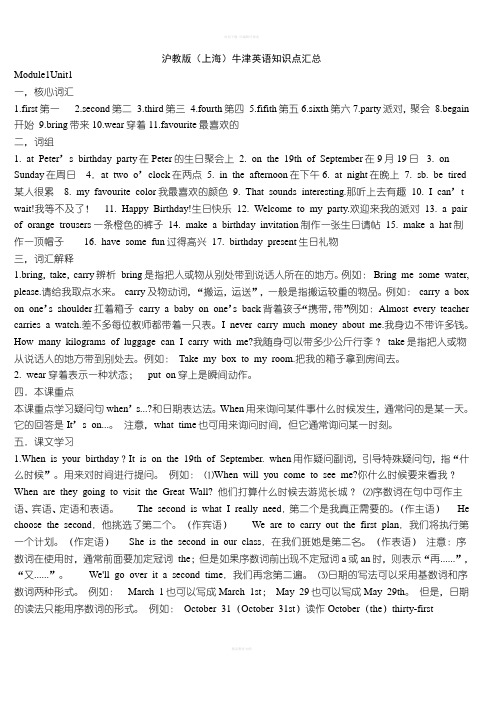
沪教版(上海)牛津英语知识点汇总Module1Unit1一,核心词汇1.first第一2.second第二3.third第三4.fourth第四5.fifith第五6.sixth第六7.party派对,聚会8.begain 开始9.bring带来10.wear穿着11.favourite最喜欢的二,词组1. at Peter’s birthday party在Peter的生日聚会上2. on the 19th of September在9月19日3. on Sunday在周日4.at two o’clock在两点5. in the afternoon在下午6. at night在晚上7. sb. be tired 某人很累8. my favourite color我最喜欢的颜色9. That sounds interesting.那听上去有趣10. I can’t wait!我等不及了!11. Happy Birthday!生日快乐12. Welcome to my party.欢迎来我的派对13. a pair of orange trousers一条橙色的裤子14. make a birthday invitation制作一张生日请帖15. make a hat制作一顶帽子16. have some fun过得高兴17. birthday present生日礼物三,词汇解释1.bring,take,carry辨析bring是指把人或物从别处带到说话人所在的地方。
例如:Bring me some water, please.请给我取点水来。
carry及物动词,“搬运,运送”,一般是指搬运较重的物品。
例如:carry a box on one’s shoulder扛着箱子carry a baby on one’s back背着孩子“携带,带”例如:Almost every teacher carries a watch.差不多每位教师都带着一只表。
沪教牛津版英语三年级上册词组语法

沪教牛津版英语三年级上册词组语法沪教牛津版英语三年级上册是一本教材,旨在帮助学生掌握基础的英语词组和语法知识。
以下是相关参考内容:一、词组1. Hello/Goodbye- Hello, how are you?- Goodbye, see you later.2. How old are you?- I'm six years old.3. What's your name?- My name is Tom.4. Nice to meet you.- Nice to meet you too.5. What color is it?- It's red/green/blue/yellow.6. How many?- How many pencils do you have?7. Where is it?- It's on/under/in/behind/near the table.8. What do you have?- I have a book/pencil/bag.9. How do you go to school?- I go to school by bus/by bike/on foot.10. What's the weather like?- It's sunny/cloudy/windy/rainy.二、语法1. Be动词的用法- I am happy.- You are my friend.- He is a teacher.- She is a doctor.- It is a cat.- We are in the park.- They are students.2. 人称代词的用法- I am a student.- You are my friend.- He is a teacher.- She is a doctor.- We are in the park.- They are students.3. 冠词的用法- This is a pencil.- That is an apple.- I have an eraser.- She has a doll.- We are playing with a ball.4. 名词的复数形式- I have two pencils.- They are my friends.- We have three books.5. 人称代词的所有格- This is my pen.- That is your book.- It is his/her bag.- These are our toys.- Those are their bikes.6. 一般现在时的用法- I like to play soccer.- He likes to read books.- She likes to sing songs.- We like to eat ice cream.- They like to watch movies.7. 一般疑问句的构成- Do you like to dance?- Does he like to swim?- Does she like to play tennis? - Do we like to cook?- Do they like to paint?8. 物主代词的用法- This is mine.- That is yours.- It is his/hers.- These are ours.- Those are theirs.9. 数词的用法- I have one apple.- She has two cats.- They have three dogs.10. 时间状语的用法- I get up at 7 o'clock.- She goes to bed at 9 o'clock.- We have English class on Monday.- They go to the park in the morning.以上是沪教牛津版英语三年级上册的词组和语法相关参考内容。
七年级上英语知识梳理(上海牛津版)U5-U6
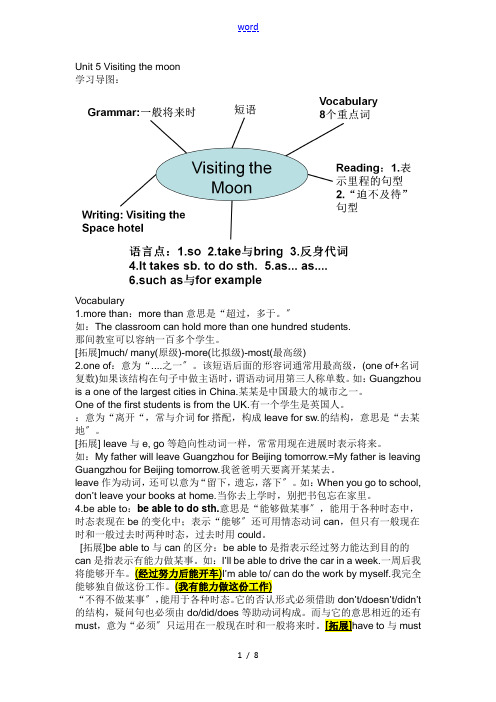
Unit 5 Visiting the moon学习导图:Vocabulary1.more than:more than意思是“超过,多于。
〞如:The classroom can hold more than one hundred students.那间教室可以容纳一百多个学生。
[拓展]much/ many(原级)-more(比拟级)-most(最高级)2.one of:意为“....之一〞。
该短语后面的形容词通常用最高级,(one of+名词复数)如果该结构在句子中做主语时,谓语动词用第三人称单数。
如:Guangzhou is a one of the largest cities in China.某某是中国最大的城市之一。
One of the first students is from the UK.有一个学生是英国人。
:意为“离开“,常与介词for搭配,构成leave for sw.的结构,意思是“去某地〞。
[拓展] leave与e, go等趋向性动词一样,常常用现在进展时表示将来。
如:My father will leave Guangzhou for Beijing tomorrow.=My father is leaving Guangzhou for Beijing tomorrow.我爸爸明天要离开某某去。
leave作为动词,还可以意为“留下,遗忘,落下〞。
如:When you go to school, don’t leave your books at home.当你去上学时,别把书包忘在家里。
4.be able to:be able to do sth.意思是“能够做某事〞,能用于各种时态中,时态表现在be的变化中;表示“能够〞还可用情态动词can,但只有一般现在时和一般过去时两种时态,过去时用could。
[拓展]be able to与can的区分:be able to是指表示经过努力能达到目的的can是指表示有能力做某事。
上海牛津英语8BUnit1_知识点梳理--彭三彭胜娟
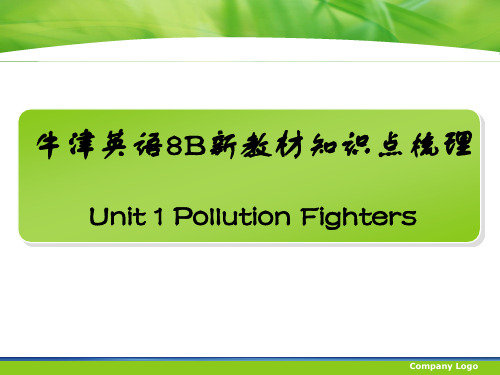
Unit 1 Pollution Fighters
Company Logo
Vocabulary
1.live v. 生活 adj. living adj. alive
有生命的 活着的
living things keep your whole class /us alive
Vocabulary
9.Everyone must help to fight against __________ pollution to make our earth clean. (pollute) 10.We can _________ breathe fresh oxygen with the help of trees. (breath) 11.People cut down and burn millions of trees, but they _________ replace hardly any of them. (place) 12.The factory releases _________ harmful gases into the air and pollutes the environment seriously. (harm) 13.The trees can protect themselves by producing a nasty __________. chemical (chemistry) 14.It’s not good of you to write or draw something on the __________ wooden desks. (wood) 15.I’m ________ really sorry for not knowing a lot about trees. (real) 16.Trees can _____________ communicate with each other underground. (communication)
新版牛津英语上海版A知识点归纳

新版牛津英语上海版A知识点归纳1.问候与自我介绍:- Hello! Hi! Good morning!等常见的问候用语。
- What’s your name? My name is...等自我介绍用语。
2.数字与颜色:-数字1-10的基本表达。
- 常见颜色的英文表达,如红色(red)、绿色(green)等。
3.询问年龄与身体状况:- How old are you? I’m...等询问年龄的用语。
- How are you? I’m fine/good.等询问身体状况的用语。
4.询问喜欢与不喜欢的事物:- Do you like...? Yes, I do./No, I don’t.等询问喜欢事物的用语。
- What do you like? I like...等回答自己喜欢的事物的用语。
5.熟悉家庭与常见动物:- 基本的家庭成员的表达,如father、mother、brother、sister等。
- 常见动物的英文表达,如dog、cat、bird等。
6.询问与描述外貌与人物特征:- What’s he/she like? He/She is...等询问与描述外貌与人物特征的用语。
7.学习日常用语:- May I go to the toilet, please? Can I have some water, please?等日常学习用语。
8.描述天气与季节:- What’s the weather like today? It’s sunny/rainy/cloudy.等描述天气的用语。
- 四个季节的英文表达,如spring、summer、autumn、winter等。
9.描述日常活动与习惯:- I get up at 7 o’clock. I go to school at 8 o’clock.等描述日常活动与习惯的用语。
10.描述食物与饮料:- 常见食物与饮料的英文表达,如apple、orange、milk、juice等。
上海版牛津英语6A知识点整理
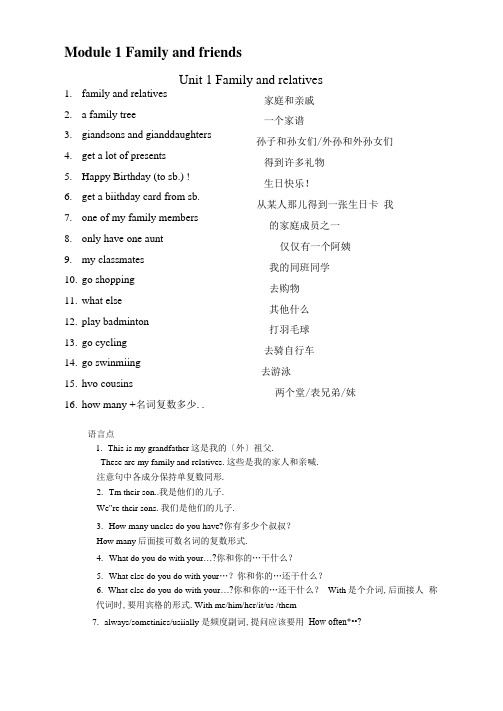
Module 1 Family and friendsUnit 1 Family and relatives1.family and relatives2. a family tree3.giandsons and gianddaughters4.get a lot of presents5.Happy Birthday (to sb.) !6.get a biithday card from sb.7.one of my family members8.only have one aunt9.my classmates10.go shopping11.what else12.play badminton13.go cycling14.go swinmiing15.hvo cousins16.how many +名词复数多少..家庭和亲戚一个家谱孙子和孙女们/外孙和外孙女们得到许多礼物生日快乐!从某人那儿得到一张生日卡我的家庭成员之一仅仅有一个阿姨我的同班同学去购物其他什么打羽毛球去骑自行车去游泳两个堂/表兄弟/妹语言点1.This is my grandfather这是我的〔外〕祖父.These are my family and relatives.这些是我的家人和亲喊.注意句中各成分保持单复数同形.2.Tm their son..我是他们的儿子.We"re their sons.我们是他们的儿子.3.How many uncles do you have?你有多少个叔叔?How many后面接可数名词的复数形式.4.What do you do with your…?你和你的…干什么?5.What else do you do with your…?你和你的…还干什么?6.What else do you do with your…?你和你的…还干什么?With是个介词,后面接人称代词时,要用宾格的形式.With me/him/her/it/us /them7.always/sometinies/usiially 是频度副词,提问应该要用How often*••?Unit 2 I have a good friend1.help each other 互相帮助2.help other people = help others3.not...at all4.go out at night5.like to be together6.walk to school together7.be friendly8.be helpful9.work hard = study hard10.be late for school11.get angiy12.be kind to others13.share sth. with sb.14.be never naughty 从不淘气15.never tell a lie/lies16.a visit to sp.帮助别人根本不在晚上出去喜欢在一起一起走去学校友好的有帮助的努力学习上学迟到变得生气对别人友善的和某人分享某物从不说谎一次去某地的参观17.live ill the USA = live in America 居住在美国18.visit sp. for the first time19.ask sb. about sth.20.hai,e/has been to sp.21.Ocean Park22.Garden City Zoo23.Water World24.Friends of the Earth25.look after = take caie of26.look after the environment27.all the things round us28.pollute the air 第一次参观某地询问某人关于某事曾去过某地海洋公园花园城市公园水上世界地球的朋友照顾,照看照顾环境我们周围所有的东西污染空气29.ak pollution30.water pollutionnd pollution32.keep sth. clean33.pick up34.put nibbish into mbbish bins35.tell sb. to do sth.36.tell sb. not to do sth.37.leave nibbish38.want to be/become39.want to do sth.40.promise to do sth.41.promise not to do sth.42.our promises 43.discuss sth. with sb.44.reuse shopping bags空气污染水污染陆地污染保持某物干净捡起,拾起把垃圾放入垃圾箱告诉某人做某事告诉某人不要做某事留下垃圾想要成为想要做某事承诺做某事承诺不要做某事我们的承诺和某人讨论某事再使用购物袋……怎么样?语言点:1.always/sometimes/usually/never 是频度副词.在句中的位置是:放在行为动词的前面,放在be动词的后面.也可以说“行前系后〞.She is always kind.她总是很善良的.She always helps other people.她总是帮助其他人.不能出现这样的句子:She is always helps other people.(X )一句话中不能同时出现两个动词.并且要注意主谓保持一致,尤其注意第三人称单数不可以忽略.2.They like to be together,他们喜欢在一起.like to do sth.=like doing sth.喜欢做某事He likes to play football.=He likes playing football,他喜欢踢足球.3.She can u t read or write.她既不会读也不会写,or用在否认句中表平列关系.and用在肯定句中表平列关系.She can read and write.她既会读又会写.4.help each other 互相帮助5.other people=others 其他人6.be kmd to sb.对某人很友好45. What about/How about sth./doing...?7.tell a lie = tell lies 说谎8.share sth. with sb.和某人分享某物She shares her bread with me .她把她的面包分给了我.9.in the USA在美国USA要大写.10.for the first time 第一次11.on Saturday具体的某一天介词用on12.Have yon been to ........ yet?你去过…..吗?Yes. I have already斤ust been to..../been there.是的,我己经去过了.No, I haven、been to .../been there yet.不,还没有去过.already/just用于肯定句中© yet用于否认和疑问句中.Unit 3 Spending a day out together1. spend a day out together——起在夕卜度过——天2.on Gieen Island3.in Happy Town4.in Dragon Bay5.on Lucky Island6.at weekends = at the weekend7.be near sp.8.be far (away) from sp9.Seaside Town10.在绿岛上在快乐城在龙湾在幸运岛上在周末离开某地近的离开某地远的海边镇a photo of my family and me 一张我家人和我的照片11.have lunch together12.Gieen Market13.In Sumiy Town14.Space Museum15.Iii Moon Town16.an activity 一项活动17.have a barbecue18.fly kites一起吃午饭格林市场在太阳城太空博物馆在月克城进行一次烧烤放风筝19.ride bicycles 骑自行车20.make sandcastles 筑沙堡21.collect shells 收集贝壳22.make an album 制作一本照片簿23.plan to do sth. 方案做某事24.a good idea —个好主意25.which place 哪一个地方26.plan a trip 方案一次旅行27.How about .......... 怎么样?〔常用于表示建议或提议〕28.be going to + v. 打算做・・・语言点:1.at weekends= at the weekend 在周末2.near/ far away from离….近/远near后直接接地点名词3.Where have you been in….?你去了哪个地方?I have been to…in/oir••我去了•••・Where have you been in Shanghai?你到过上海哪里?I have been to Century Park in Shanghai.我到过上海的世纪公园©6.a photo of my brother and me 一张我哥和我的照片.a photo of后接人称代词时,应该用宾格形式a photo of me/him/her/it/us /them7. be +V-ing表现在进行时8. cost以物作主语,通常是问价钱Take以it作主语.通常是花费时间It takes me 15 minutes to go to school.Spend以人作主语,既可以是花费金钱,也可以是花费时间.Spend time/money on sth. spend time/money in doing sth. I spend two yuan on this pen.=l spend two yuan in buying this pen.9.Which place shall we visit?我们将参加哪个地方?10.When are we going to come back?我们将什么时候回来?Come back 回来Be going to 表将来begoing to=will 11. How are we going to get there?我们将怎样到达哪里?How对交通工具进行提问.答复可以用by bus/ car e*7 on foot 12. How much does itcost?它花费多少钱?How much对价钱提问13. How about二what about怎么样?14.a.m./p.m,分别表示上午和下午.Module 2 Places and actMtiesUnit 4 Wliat would you like to be?1. different jobs不同的职业语言点:1. would like to do sth ,想要做某事2. Would you like to be a/an...?你想要成为一个Yes z I would./No, I wouldn't.是的,我 想./不,我不想.3. Why/Why not?为什么? /为什么不?I would like to be a/an.. .because ........ 我想成为….,由于….2. would like to be/become3. a secretaiy4. a bank clerk5. a policewoman6. a dentist7. a pilot8. a fireman9. a postman 10. a shop assistant 11. teach cliildren English 12. make sick people better 13. drive a bus 14. put out fires 15. cook food for people16. make our city a safe place 使我们的城市 想要成为…… 一名秘书 一个银行职员 一个女警察 一名牙医 一名飞行员 一个消防队员 一名邮递员一个商店营业员 教孩子们英语 使病人好转 驾驶一辆公交车 扑灭火 为人们烧食物 〔成为〕一个平安的地方17. interview sb. 18. find out 19. stark work 20. finish work21. in themoniing/aftenioon/e^^ening22. Why not? 采访某人查明;弄清〔情况〕 开始工作结束工作 在早上/下午/晚上 为什么不呢?I would like fried eggs for dumer tonight.我晚饭想要吃炒蛋.I fried eggs yesterday.我昨天炒了蛋.4.Would you like rice or noodles for dinner tonight?你晚饭是想吃饭还是吃面条?or在这里是标示一种选择关系.5..What kind of soup/fhut would you like?你想要哪种汤/水果?6.1 would also like some soup.=I would like some soup, too.also, too两个都可以表示“也〞,aLs.用在句中,但是to.用在句尾,并且要用逗号隔开.7.need to do sth镭要做某事.We need to buy some food first.我们需要先买一些食物口8.shopping list 购物单 .Shopping动词的mg形式在句中充当定语.9.favourite=like best 最喜欢的10.Let1 s have tomato.让我们有西红柿.Let后而接动词原形.Il in the market / in the supermarket 在市场/在超rfj12. at the fish/fiuit/meat.. .stall 在鱼/水果/肉... 摊位13. in the fish/firuit/meat...section 在鱼/水果/肉... 部门in die market,at die fish/fruit/meat...stallin die supermarket >in die fish'fhiiv'meat • • • se ction14.A:Have you bouglit any garlic?你买了一些大蒜吗?B: Yes, I have bouglit some garlic./ Yes, I have.是的,我买了些大蒜.这是个现在完成时,bought是buy的过去分词.现在完成时的构成是:have/has +动词的过去分词.它的回容许该用have/hasc Has she bouglit some oranges? Yes. she has.15.How much was it?=How much did it cost?= What was the price of it? 它多少钱.Price是“价格〞的意思.16.Where did you buy ivthem? in the supermarket in die ••• sectionUnit 5 Open Day1. an Open Day 一个开放日2. Open day programme3. . ail entrance 一个入口处4. listen to a choir5. a noticeboard6. my parents7. meet sb. at the entrance8. airive in +大地方到达一个大地方 9. arrive at +小地方到达一个小地方 10. visit the classroom11. First, ... /Next, ... /Then, .../ After that, .../ Finally, ...知识点1.1 arrive at / arrive in / reach / get to 到达 anrve at 后接小地方 arrrve in 后接大地方I arrive at school at 7:15.He will amve in Shanghai at two o'clock. reach 是个及物动词,后面直接接地点名词开放日活动安排听一个合唱队〔唱歌〕 一块布告栏 我的父母亲 在入口处迎接某人 参观教室12. look at our class projects 13. in the Arts and Crafts room 14. in the hall 15. our English Club 16. have tea and cakes 17. in the Music room18. welcome the parents on the Open Day 19. in difiereiit places 20. on the giound floor 21. write an invitation 22. take some photos 23. have a gieat'good time首先,紧接着,然后,在那以后,最后看一看我们的班级习作工程在美术劳技室 在大厅里 我们的英语俱乐部 喝茶吃蛋糕 在音乐室在开放日欢送父母 在不同的地方在第一层〔英式表达法〕 写一封邀请函 拍一些照片 过得愉快I reach school at 7:15.I get to school at 7:15.2.will / be going to都是用来表将来的,他们后面应该接动词的原形.Will是个情态动词,没有人称的变化.He will arrive in Shangliai at two o'clock.I will meet them at the entrance.Your parents will arrive at two o'clock.但是be going to有人称的变化.He is gomg to go fishing tomorrow. I am going to go fishing tomorrow. They are going to go fishing tomorrow.3.look at 看:see 看见;listento 听:hear 听见4.at die entrance 在入口处enter 进入〔动词〕in the halVin the Music room /in classroom6A' iii the Arts and Crafts room5.具体的某一天介词只能用onChi Sunday, On Sunday moming,Oii the Open Day6.在具体的某一楼层只能用介词on ,并且第几层还要用序数词On die ground floor, on the first floor, on the fifteenth floor7. want sb. to do sth. = would like to do sth.想要做某事I want you to read English everyday.我想要你们每天都读英语.1.1n die same place / in different places9.First,.../Next..../Then.../After that,.../Filially,... Fuially=at last =iii the end10.take photos 拍照IL invite邀请〔动词〕invitation邀请〔名词〕Invite sb to sp邀请某人去某地She invites me to her birthday party.她邀请我去她的生日晚会.12.on the tenth of September / on September tenth 9 月10 I i13.two fifteeii= a quarter past two 2:15Three ten = ten past three3:10 One thirty = half past one1:30 two fbrty = twenty to three 2:4014.have a great / good tmie玩得开心,过的愉快15.Parent = fatlier or mother parents = father and motheUnit 6 Going to school1.traveling time to school 去学校行走时间2.it takes sb. some time to do stli.某人花一段时间做某事3.It takes him about ten minutes.他花大约十分钟©4.half an hour 半小时5.go to sp. by ferry乘渡船去某地6.go to school on fbot=walk to school 步行去学校7.how long 多久8.get to sp,到达某地9.get to the supermarket 到达超r|j10.get there/liere/liome 到达那儿/这〕1/家里11.a restaurant 一个饭店12.a hotel 一个旅馆13.an advertisement board 一块厂•告牌14.afew + c.n.几个;一些〔后跟可数名词复数〕15.alotof+cn&un许多〔后跟可数名词复数或不可数名词〕16.on one^ way to school在某人去某地的路上17.on my way to school在我去学校的路上18.by hght rail 乘轻轨19.department stores 百货商店20.go to knidergarten 上幼儿冠语言点L near离,,很近后面直接接地点I live near school =My home is near school.我家离学校很近.2.far away from=far from 离,,很远He lives far away from school.=His home is far from school.他家离学校很远3.by bus/bike/carAmderground/traWferry其他的交通工具都能用take来表示乘,但bike 只能用ride take a bus/bike/caiAmderground/train/feny nde a bikeHe goes to school by bus =He takes a bus to school.He goes to school by bike.=He rides liis/a bike to school =He cycles to school. 4. on foot Shegoes to work on foot every day=She walks to work every day.5.It takes sb. some tune to do sth.花费某人多少时间做某事.It takes me about fifteen minutes to go to school.我去学校要花费15分钟.6.half an hour=30 minutes 用 \ half an hour 后面就不能再有minutes o7.travelling time to school去学校的旅途时间8.How long does it take you to get to…它花费你多长时间到达〞9.get to 〞到达,,〞表示“到达那里〞只能说getthere10.on one^s way to ...在某人去某地的路上On my way to school在我去学校的路上ll.some/alotof既可修饰可数名词又可以修饰不可数名词.当与可数名词连用时,只能与可数名词的复数形式连用12. a企w只能修饰可数名词,与可数名词的复数形式连用a little只能修饰不可数名词13.on the bus在公共汽车上on the underground在地铁上I see a lot of trees when I am on die bus,在公共汽车上的时候,我看见了许多树.When在本句中作连词,意为“当〞,,的时候〞14. one and a half hours=one hour and a half 一个半小时One hour and twenty minutes 一小时二十分钟Unit 7 Rules roimd us1. rules and signs 规那么和标记2. have rules in the classroom 在教室里有规那么3. have rules on die road 在马路上有规那么4. must do 必须做5. must keep quiet 必须保持安静6. must not do sth.= mustn't do sth. 不准:禁止做7. mustn't eat or dniik 不准吃或喝8. wait for 等候9. walk on the grass 走在草地上10. listen to the teachers 听老师11. run across the road 跑过马路12. pick die flowers 摘花13. enter the centre 进入中央14. climb the trees 爬树15. talk loudly 大声交谈16. turn left/nght 向左/右转17. a lift 一部电梯18. an escalator 一部自动扶梯19. on the left 在左边20. on the right 在右边21. die one on the left/right 在左边的/右边的一个22. die one in the middle 在中间的一个23. go upstairs 上楼24. go downstairs 下楼语言点1. in the library/in the classroom'm the parkon the road 在路上2. We must not walk on the grass.我们不可以踩在草上.We must keep quiet.我们必须保持安静.must 意为“必须〞表示很重要或必要.must not 意为“不准〞,表示不允许或禁止must 是个情态动词,后而接动词原形.3. aross the road 穿过马路4. wait for 等待5 .We mustn ff t eat or drink. or 用于否认句中表示“并列工and 用于肯定句中表示"并列6 .Don K t talk loudly.=We mustn fC t talk loudly.Don 〞不得,不要.该句为祈使句的否认形式.Don%后面接动词原形.talk loudly 副 词修饰动词 7 .What does this sign mean?这个标志意味着什么?What does this sign mean?=Avhat is the meanuig of tliis sigil?8 .Where can we find it?我们在哪里能找到它?9 .Which door must we use?我们必须要使用哪一扇门?情态动词的一般疑问句就是把情态动词提前,后面照抄.句号改为问号.Must we wait for the green man?10 .the one on the left/riglit 左边/右边的这个 the one in the middle 中间的这个如果是介词短语修饰the one,应该要放在the one 后而,如果是形容词应放the one 的中间 the left/riglit one die middle one12 .be late for school 迟到13 .findout 查出,弄清14 .talk to sb,对某人说,跟某人交谈.talk about sb./sth.谈论关于某人/某事.15 . tell sb. to do sth.告诉某人去做某事tell sb. not to do sth.告诉某人不要做某事It tells us to keep quiet.它告诉我们要保持安静.It tells us not to talk loundly.它告诉我们不要大声说话.Module 3 Food and DrinkUnit 8 Hie food we eat1. dinner menu 晚餐菜单2. cabbage soup 卷心菜汤25. an exit26. chase each other27. keep class rules28. break class niles 一个出口 互相追逐 遵守班级规那么 违反班级规那么3.chicken soup 鸡汤4.fried cabbage 炒卷心菜5.steamed prawns with garlic 蒜蓉蒸虫卜6.steamed fish 清蒸鱼7.fried eggs with bacon 熏肉炒蛋8.fried chicken wings 炸鸡翅9.boiled eggs 水煮蛋10.baked potato 烤上豆11.tomato and egg soup 番茄蛋汤12.after dinner 晚餐后13.What kind of...什么种类的.° °14.need to do sth.需要做某事15.would like noodles for dumer 晚餐想吃而条16.like seafood 喜欢海鲜17.m the market 在市场18.ui the supermarket 在超市19.at the fish stall 在鱼摊20.m the fhut section 在水果部门21.frozen food冰冻食物22.like to eat dumplings 喜欢吃饺子23. a packet of 一包/袋24.two hamburgers 两个汉堡包25.fiuit salad水果色拉语言点1. fbr breakfast/lunch/supper/dinnerWhat would you like for dumer tonight?今天晚饭你们想吃什么?for在这里表目的,用途2/c d=xvould "d 是would 的缩写形式.would like sth.=^vant sth.想要某物would like to do stli.=\vould love to do sth.=\vant to do sth.想要做某事like sth.喜欢某物like to do sth./like doing sth.喜欢做某事I would like some apples.我想要一些苹果.I like apples.我喜欢苹果.I would like to swim after school.放学后我想去游泳口I like swimming.=1 like to swim.我喜欢游泳.3.steamed eggs (with meat)(肉)蛋baked potato 烤上豆boiled eggs 水煮蛋fried eggs 炒蛋在这里steamed- baked .'boiled/fried都是动词的过去分词形式,在句中做定语. 相当于形容词的用法.I would like fried eggs for dumer tonight.我晚饭想要吃炒蛋.I fried eggs yesterday.我昨天炒了蛋.3. Would you like rice or noodles for dinner tonight?你晚饭是想吃饭还是吃面条?or在这里是标示一种选择关系.5.What kuid of soup/fiint would you like?你想要哪种汤/水果?1.1would also like some soup.=I would like some soup, too.also, too两个都可以表示“也〞,also用在句中,但是to.用在句尾,并且要用逗号隔开.7.need to do sth.需要做某事°We need to buy some food first.我们需要先买一些食物*8. shopping list购物单.Shoppmg动词的mg形式在句中充当定语.9.favounte=like best 最喜欢的10.Let n s have tomato.让我们有西红柿口Let后面接动词原形.11.iii the market / m the supermarket 在r|j场/在超rb12. at die fish/fruit/meat •••stall 在鱼/水果/肉,,,,摊位13. in the fisWfhiit'meat• • • section 在鱼/水果/肉〞〞部门in the market, at die fish'friiit'meat …stallin die supermarket, in die fish/fruit/meajsection14.A:Have you bought any garlic?你买了一些大蒜吗?B: Yes, I have bought some garlic./ Yes, I have.是的,我买了些大蒜.这是个现在完成时,bought是buy的过去分词.现在完成时的构成是:have,lias +动词的过去分词.它的回容许该用have/hasc Has she bouglit some oranges? Yes, she has.15.How much was it?=How much did it cost?= What was the price of it? 它多少钱.Price是“价格〞的意思.Unit 9 Picnics are fini1.plan a picnic方案一次野餐2.have a picnic进行一次野餐3.Picnics are ftm,野餐时有趣的事4.some cola 一些可乐5.spicy sausages 辣香肠6. a packet of nuts 一袋坚果7.lemon tea 柠椽茶8.Shall we...?/Lets...让我们好吗?9.taste nice with jam加了果酱尝起来美味的10.buy some snacks 买一些点心11.sweet cakes 甜的蛋糕12.salty nuts咸的坚果13.spicy chillies 辛辣的辣椒14.sour lemons 酸的柠檬15.bitter coffee 苦的咖啡16.spread some jam on the bread 在而包上抹上一些果酱17.prepare for a picnic为一次野餐做准备18.have got enough money 有足够的钱19.May I have some..please?我可以吃些吗?20.Would you like some...?你想要些© ° ° 吗?Umt 101.healthy eating健康的饮食2.good diets and bad diets好的食谱和不好的食谱3. a fbodpyramid 一个食物金字塔4.need a little fat, salt and sugar 需要一点脂肪,盐和糖5.some yogurt 一些酸奶6.plenty of大量的,充足的7.fresh fruit and vegetables新鲜的水果和蔬菜8.be unhealthy 不健康的9.have an uiiliealthy diet 有不健康的食谱10.do no exercise 不做运动11.be fit and healthy 健康的12.live in the coiuitryside 住在乡村13.stay with sb.和某人呆在一起14.become fit and healthy 变得健康的15.have some porridge for breakfast 早餐吃些粥16.be healtliier than 比0 °.健康17.be less health than 不如健康18.be as healthy as 像一样健康19.be as unhealthy as 像° 0 °一样不健康20.as... as 像口..一样:如同21.one...the other 一个」..另一个22.goodeatmghabits良好的饮食习惯23.do a quiz做一个小测试24.should do stli,应该做某事25.should not do stli. = shouldn't do sth.不应该做某事26.some suggestions for good eating habits 良好的饮食习惯的一些建议知识点:1. Shall we have a picnic tomorrow?=Let K s have a picnic tomorrow. 明天我们野餐怎么样?/我们明天去野餐吧!ice cream冰淇淋porridge 粥lemon tea柠檬茶have a little tea 喝点茶be healtliier than*,•比° °.更健康be less healthy than…比...相比,不太健康as healthy as…和°..一样健康steamed chicken 蒸鸡steamed fish 蒸鱼a lot of boiled vegetables 很多水煮蔬菜be unhealthy 不健康as unhealthy as…和° °.一样不健康知识点:1.It shows us how much of each kind of food we need every day.它显示了我们每天需要多少种各种食物.2.show sb. sth.=show sth. to sb.向某人展示某物He shows his new photo to me.=He shows me his new photo.他把他的新照片给我看了, 3.We need a little fat, salt and sugar.我们需要一点脂肪、盐和糖.need sth.需要某物4. a little修饰不可数名词some. 'plenty of/a lot of既可修饰可数名词也可以修饰不可数名词.5. a lot of > plenty of > some6.How much ...do we need ?我们需要多少 ... ?7.He had an uiiliealthy diet and did no exercise他有个不健康的饮食,并且不做运动.Exercise不可数名词©8.fit=healtliyhealtliy——iinhealtliy 一对反义词healtli名词健康healthy——unhealthy 形容词9.have breakfast/lxinch/supper/dinner 吃早饭/午饭/晚饭10.What do you usually have for breakfast/hinch,dinner?你通常早饭/午饭/晚饭吃什么?11.healtliier tliaii 比——健康less healthy than比——不健康as healthy as像——一样的健康as uiiliealthy as像——一样的不健康than用于比拟级中as…as用于原级比拟Unit 11 Let's make a pizza单词和短语make a pizza做一个比萨饼fiinny pizza有趣的比萨饼looks very interesting看起来非常有趣make one more 再做一个look at the ingredients first 先看看原料a few slices of ham 几片火腿tliree sausages 三只香肠two green peppers 三只青椒two tomatoes两个西红柿a piece of bread 一片面包a small tin of tomato sauce 一小罐西红柿酱a few chemes 一些樱桃Firstly/ Secondly/ Next'' Then /After that/ Finally 首先/第二/接着/然后/在那之后/最后a tliick piece of bread 一片猴面包as a base 做底put some tomato sauce on it在上面放一些番茄酱in the middle 在中间on the right of cherry在樱桃的右边another slice of sausage 另——片香肠on the left在左边put a slice of green pepper above each slice of sausage放一片青椒在每片香肠上面put a slice of tomato below die cherry 放一片西红柿在樱桃卜面on both sides of the bread 在而包的两边put die pizza in a hot oven把比萨放在一个热烤箱里bake it for 5 minutes 烤十分钟pastry而团cheese奶酪strawberry 草徒onion洋葱pineapple 菠萝sweetcorn甜玉米beef牛肉cherry樱桃other ingredients 其它的作料Tlie Wangs王先生一家人order food and drnik点食物和饮料知识点:1.What would you like to have as die base of your pizza? I would like...2.What would you like on yoin pizza? I would like on my pizza.3.This is …这是3. Shall we make one more?我们再做一个?5.Firstly, Secondly, Next, Tlieii, After that, Fmally6.a slice of /slices of: a tin of'' tins of: a bag o£z bags of; a piece of '1 pieces of 7,Tlie Waiigs are goi ng to Ainencaii Pizza./ Italian Pizza/ French Pizza, the + 姓氏的复数,可以表示一家人:be gomg to do sth将要做某事。
沪教版(上海)牛津英语知识点汇总

沪教版(上海)牛津英语知识点汇总Module1Unit1一,核心词汇1.first第一2.second第二3.third第三4.fourth第四5.fifith第五6.sixth第六7.party派对,聚会8.begain 开始9.bring带来10.wear穿着11.favourite最喜欢的二,词组1.at Peter’s birthday party在Peter的生日聚会上2.on the19th of September在9月19日3.on Sunday在周日4.at two o’clock在两点5.in the afternoon在下午6.at night在晚上7.sb.be tired 某人很累8.my favourite color我最喜欢的颜色9.That sounds interesting.那听上去有趣10.I can’t wait!我等不及了!11.Happy Birthday!生日快乐12.Welcome to my party.欢迎来我的派对13.a pair of orange trousers一条橙色的裤子14.make a birthday invitation制作一张生日请帖15.make a hat制作一顶帽子16.have some fun过得高兴17.birthday present生日礼物三,词汇解释1.bring,take,carry辨析bring是指把人或物从别处带到说话人所在的地方。
例如:Bring me some water, please.请给我取点水来。
carry及物动词,“搬运,运送”,一般是指搬运较重的物品。
例如:carry a box on one’s shoulder扛着箱子carry a baby on one’s back背着孩子“携带,带”例如:Almost every teacher carries a watch.差不多每位教师都带着一只表。
牛津上海版初中英语各单元知识点汇总
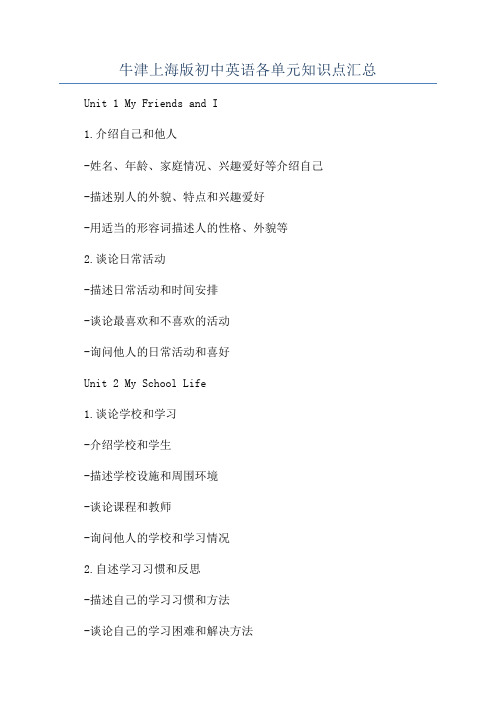
牛津上海版初中英语各单元知识点汇总Unit 1 My Friends and I1.介绍自己和他人-姓名、年龄、家庭情况、兴趣爱好等介绍自己-描述别人的外貌、特点和兴趣爱好-用适当的形容词描述人的性格、外貌等2.谈论日常活动-描述日常活动和时间安排-谈论最喜欢和不喜欢的活动-询问他人的日常活动和喜好Unit 2 My School Life1.谈论学校和学习-介绍学校和学生-描述学校设施和周围环境-谈论课程和教师-询问他人的学校和学习情况2.自述学习习惯和反思-描述自己的学习习惯和方法-谈论自己的学习困难和解决方法-做学习计划和目标-给他人学习建议和鼓励Unit 3 At Home1.描述家庭和住所-描述自己的家庭成员和住所-谈论家庭活动和责任分工-询问他人的家庭和住所情况2.谈论房间和家居用品-描述自己的房间和家居用品-谈论喜欢和不喜欢的房间和家具-询问他人的房间和家居用品情况Unit 4 Out and About1.指路和交通方式-描述如何去其中一地方-描述不同的交通方式-询问他人如何到达其中一地方2.谈论购物和交易-描述购物的地点和方式-询问商品的价格和数量-谈论交易的方式和经验Unit 5 Food and Drinks1.描述食物和饮品-描述不同种类的食物和饮品-询问食物和饮品的口味和偏好-谈论不同的饮食习惯和习惯-谈论对食物和饮品的看法和建议2.谈论饮食习惯和健康-描述自己的饮食习惯和健康问题-谈论健康生活方式和饮食习惯Unit 6 Hobbies1.介绍兴趣爱好和活动-描述自己和他人的兴趣爱好和活动-询问他人的兴趣爱好和活动2.谈论喜欢的体育运动-谈论自己喜欢的体育运动和运动员-询问他人喜欢的体育运动和运动员-谈论体育运动的好处和意义Unit 7 Holidays1.描述假期活动和旅行-描述过去和将来的假期活动-描述旅行的目的地、交通方式和活动-询问他人的假期活动和旅行计划2.谈论文化活动和习俗-描述不同的文化活动和习俗-谈论自己参与过的文化活动和习俗-询问他人的文化活动和习俗Unit 8 In Town1.描述城市景点和地标-描述自己所在的城市景点和地标-谈论旅游的经历和感受-询问他人所在城市的景点和地标2.指导他人如何参观和游玩-描述参观和游玩的流程和方式-给他人参观和游玩的建议和指导-询问他人参观和游玩的经验和意见Unit 9 Weather1.描述天气和季节-描述不同季节的天气和气候-谈论喜欢和不喜欢的天气和季节-询问他人所在地和将要去的地方的天气情况2.谈论天灾和自然现象-描述不同的天灾和自然现象-谈论对天灾和自然现象的了解和防范Unit 10 Out in Nature1.谈论动物和植物-描述不同种类的动物和植物-询问动物和植物的特点和习性-谈论对动物和植物的保护和关注2.描述户外活动和自然景观-描述自己喜欢和参与过的户外活动和自然景观-询问他人喜欢和参与过的户外活动和自然景观。
牛津上海版英语六年级上学期教材梳理及练习 Unit3
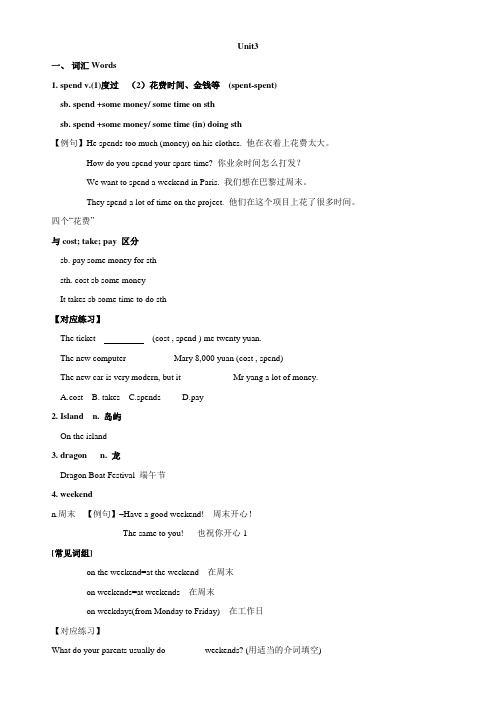
Unit3一、词汇Words1. spend v.(1)度过(2)花费时间、金钱等(spent-spent)sb. spend +some money/ some time on sthsb. spend +some money/ some time (in) doing sth【例句】He spends too much (money) on his clothes. 他在衣着上花费太大。
How do you spend your spare time? 你业余时间怎么打发?We want to spend a weekend in Paris. 我们想在巴黎过周末。
They spend a lot of time on the project. 他们在这个项目上花了很多时间。
四个“花费”与cost; take; pay 区分sb.pay some money for sthsth. cost sb some moneyIt takes sb some time to do sth【对应练习】The ticket (cost , spend ) me twenty yuan.The new computer __________ Mary 8,000 yuan (cost , spend)The new car is very modern, but it ___________ Mr yang a lot of money.A.c ostB. takesC.spendsD.pay2. Island n. 岛屿On the island3. dragon n. 龙Dragon Boat Festival 端午节4. weekendn.周末【例句】–Have a good weekend! 周末开心!--The same to you! 也祝你开心1[常见词组]on the weekend=at the weekend 在周末on weekends=at weekends 在周末on weekdays(from Monday to Friday) 在工作日【对应练习】What do your parents usually do ________ weekends? (用适当的介词填空)5. lucky adj. 好运的;幸运的【例句】You are very lucky to be alive after that accident. 你大难不死真幸运。
牛津英语上海小学三年级上知识点整理
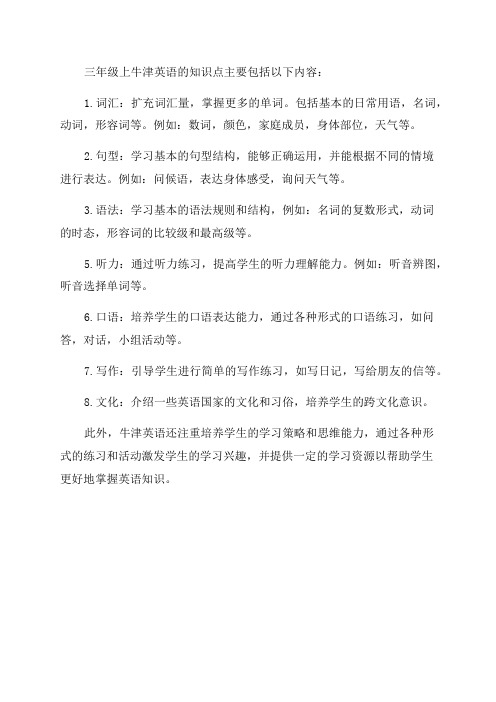
三年级上牛津英语的知识点主要包括以下内容:
1.词汇:扩充词汇量,掌握更多的单词。
包括基本的日常用语,名词,动词,形容词等。
例如:数词,颜色,家庭成员,身体部位,天气等。
2.句型:学习基本的句型结构,能够正确运用,并能根据不同的情境
进行表达。
例如:问候语,表达身体感受,询问天气等。
3.语法:学习基本的语法规则和结构,例如:名词的复数形式,动词
的时态,形容词的比较级和最高级等。
5.听力:通过听力练习,提高学生的听力理解能力。
例如:听音辨图,听音选择单词等。
6.口语:培养学生的口语表达能力,通过各种形式的口语练习,如问答,对话,小组活动等。
7.写作:引导学生进行简单的写作练习,如写日记,写给朋友的信等。
8.文化:介绍一些英语国家的文化和习俗,培养学生的跨文化意识。
此外,牛津英语还注重培养学生的学习策略和思维能力,通过各种形
式的练习和活动激发学生的学习兴趣,并提供一定的学习资源以帮助学生
更好地掌握英语知识。
牛津英语上海三年级上知识点整理(K12教育文档)
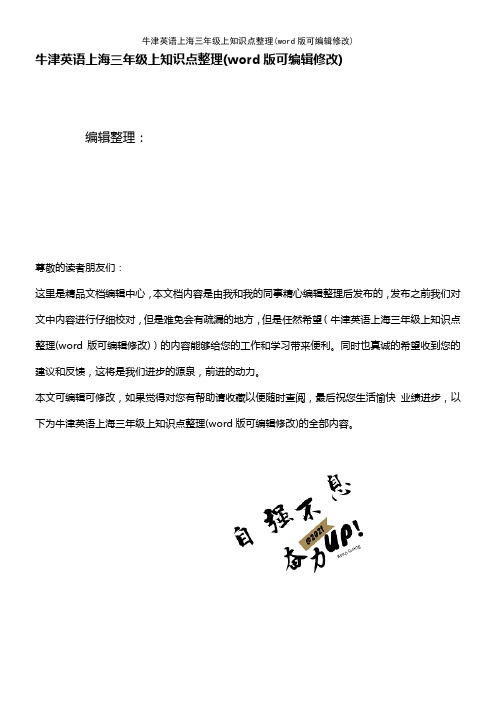
牛津英语上海三年级上知识点整理(word版可编辑修改)编辑整理:尊敬的读者朋友们:这里是精品文档编辑中心,本文档内容是由我和我的同事精心编辑整理后发布的,发布之前我们对文中内容进行仔细校对,但是难免会有疏漏的地方,但是任然希望(牛津英语上海三年级上知识点整理(word版可编辑修改))的内容能够给您的工作和学习带来便利。
同时也真诚的希望收到您的建议和反馈,这将是我们进步的源泉,前进的动力。
本文可编辑可修改,如果觉得对您有帮助请收藏以便随时查阅,最后祝您生活愉快业绩进步,以下为牛津英语上海三年级上知识点整理(word版可编辑修改)的全部内容。
牛津英语上海版三年级上册知识点整理Module1 Getting to know youUnit1 How are you?生词:Miss Fang Mr Zhang Mrs Wang音标: a [ei] cake table语法:—-How are you? —-Fine,thanks./ I’m fine too。
/ Very well,thank you.Unit2 What's your name?生词:stand up sit down open the door close the door音标: a [æ]jam hand语法:--What’s your name?-—My name is..。
Unit3 How old are you?生词: one two three four five six seven eight nin e ten音标: e [i:] he she语法:--How old are you?-—I'm 。
Module2 Me,My family and friendsUnit1 My friends生词:fat thin tall short boy girl音标: e [e] ten pen语法:He's/She’s.。
牛津上海九年级上英语知识点梳理

一、语法知识点:1.时态:包括一般现在时、一般过去时、一般将来时、现在进行时、过去进行时、过去将来时、现在完成时、过去完成时、将来完成时等。
2.从句:包括宾语从句、主语从句、定语从句、时间状语从句、条件状语从句、原因状语从句等。
3.虚拟语气:包括与过去事实相反的虚拟语气、与现在事实相反的虚拟语气、与将来事实相反的虚拟语气等。
4.直接间接引语:包括陈述句、疑问句、祈使句、感叹句等的直接间接引语的转换。
5.倒装句:包括全部倒装和部分倒装,如完全倒装句、否定谓语部分倒装、所指转移部分倒装等。
二、词汇知识点:1.词义辨析:包括同义词、反义词、近义词等的辨析。
2.短语和固定搭配:包括常见的短语和固定搭配的用法。
3.常见词根、词缀和派生词:包括常见的词根和词缀的意义和用法,以及由它们派生出来的词汇。
4.词形变化:包括名词、动词、形容词等的词形变化规则和常见例外。
5.词的运用:包括词类转换、词汇搭配等。
三、阅读知识点:1.阅读理解:包括根据文章内容回答问题、根据文章推断意义、根据文章概括出主旨等。
2.阅读策略:包括扫读、略读、细读等阅读策略的应用。
3.词义推测:根据上下文推测词义。
4.文章结构:包括主题句、段落结构、文字表达等。
四、写作知识点:1.书面表达:包括写作结构、语言表达、逻辑关系等方面的知识。
2.作文类型:包括记叙文、说明文、议论文等不同类型作文的写法。
五、听力和口语知识点:1.听力理解:包括听力材料的主旨、细节信息等的理解。
2.听力技巧:包括听力材料的答题技巧和听力材料中常见的词汇和短语。
3.口语表达:包括日常交流、口头报告等口语表达技巧。
以上是牛津上海九年级上英语的主要知识点梳理。
学生可以根据这些知识点,加强相应的练习和复习,提高自己的英语能力。
牛津上海版 六年级第一学期英语考点汇总
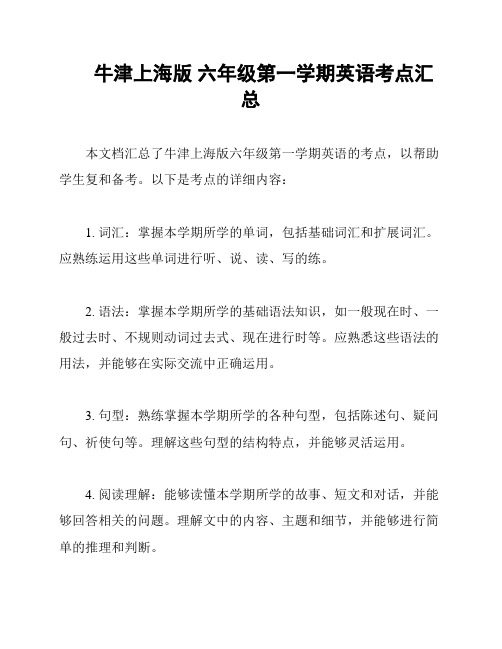
牛津上海版六年级第一学期英语考点汇
总
本文档汇总了牛津上海版六年级第一学期英语的考点,以帮助学生复和备考。
以下是考点的详细内容:
1. 词汇:掌握本学期所学的单词,包括基础词汇和扩展词汇。
应熟练运用这些单词进行听、说、读、写的练。
2. 语法:掌握本学期所学的基础语法知识,如一般现在时、一般过去时、不规则动词过去式、现在进行时等。
应熟悉这些语法的用法,并能够在实际交流中正确运用。
3. 句型:熟练掌握本学期所学的各种句型,包括陈述句、疑问句、祈使句等。
理解这些句型的结构特点,并能够灵活运用。
4. 阅读理解:能够读懂本学期所学的故事、短文和对话,并能够回答相关的问题。
理解文中的内容、主题和细节,并能够进行简单的推理和判断。
5. 听力理解:能够听懂本学期所学的对话、问答和短文,并能
够回答相关的问题。
理解听力材料中的信息、关键词和上下文,并
能够从中获取必要的信息。
6. 书写能力:书写要规范、清晰、工整。
应注意字母的大小写、大小比例和书写流畅度。
能够正确书写所学的单词、短语和句子。
7. 口语表达:能够运用所学的句型和词汇进行口语交流。
应注
意语音语调的准确性和自然流利度。
能够表达自己的观点、描述事
物和表达意愿。
希望通过对以上考点的复和总结,学生们能够在英语考试中取
得好成绩。
祝大家好运!
(Word count: 195)。
牛津英语上海版三年级上册知识点整理

牛津英语上海版三年级上册知识点整理Unit1 How are you?生词:Miss Fang Mr Zhang Mrs Wang音标:a cake table语法:How are you? Fine;thanks./ I’m fine too./ Very well;thank you. Unit2 What’s your name?生词:stand up sit down open the door close the door音标:a jam hand语法:What’s your name? My name is...Unit3 How old are you?生词:one two three four five six seven eight nine ten音标:e he she语法:How old are you? I’m ...Module2 Me;My family and friendsUnit1 My friends生词:fat thin tall short boy girl音标:e ten pen语法:He’s/She’s...Is he/she...?Yes;he/she is. No;he/she isn’t.Unit 2 My family生词:grandfather grandmother father mother brother sister me 音标:i kite bicycle语法:Who’s he/she?He’s/She’s...Unit3 About me生词:eye nose hair ear mouth音标:i pig pink语法:My...is/are...Module3 Places and activitiesUnit1 My school生词:school library toilet hall playground classroom 音标:o photo rose语法:What’s this? It’s...Is this...? Yes;it is. No;it’s...Unit2 Shopping生词:an apple an orange a banana a peachapples oranges bananas peaches音标:o dog shop语法:May I have...;please?Unit3 In the park生词:boat balloon flower kite音标:u pupil tube语法:Look at...What colour is it?it's...Module4 The nature wordUnit1 Insects生词:ladybird bee butterfly ant音标:u duck sun语法:What is it? It’s...Unit2 On the farm生词:chick hen duck pig dog cat 语法:What are they? They’re...How many...?Unit3 Plants生词:leaves trunk branch roots语法:Look at the plants.It has...Yes;it’s/they ‘re...。
- 1、下载文档前请自行甄别文档内容的完整性,平台不提供额外的编辑、内容补充、找答案等附加服务。
- 2、"仅部分预览"的文档,不可在线预览部分如存在完整性等问题,可反馈申请退款(可完整预览的文档不适用该条件!)。
- 3、如文档侵犯您的权益,请联系客服反馈,我们会尽快为您处理(人工客服工作时间:9:00-18:30)。
牛津英语上海版级上学期知识点罗列Revised final draft November 26, 2020牛津英语(上海版)6年级上学期知识点罗列(1)1. family 表示家庭的时候,它是单数名词表示家庭成员的时候,它是复数名词Tom’s family is a happy one. 家庭The Wang’s family go to America every year. 家庭成员FAMILY: F ather a nd m other I l ove y ou.2. grandfather 爷爷 great-grandfather 曾祖父granddaughter 孙女 great-granddaughter 曾孙女3. classmate 同学deskmate 同桌workmate 同事roommate 室友schoolmate 校友4. get sth. from sb. 从某人那里得到某物He doesn’t get any money from his parents.5. 频度副词always, usually, often, sometimes, seldom, never频度副词的位置:放在行为动词之前,be动词之后I sometimes watch TV with my grandmother.He is always late for school.6. What else do you do with her?What else 还有什么Who else will he meet 他还要见谁?Where else will you go---- else 用于特殊疑问词之后Anything else 还有什么东西么?Anyone else 还有谁么?1. exciting 令人兴奋的,使人激动的---通常修饰事物excited 感到兴奋的,感到激动的---通常修饰人interesting – interestedboring – bored 无聊的surprising – surprised 惊奇的2. who 主格whom 宾格whose 所有格My grandparents usually go to see a film with my mother. 对划线部分提问Who/Whom do your grandparents usually go to see a film with?3. Watching TV is one of the most important activities of the day.动名词短语做主语。
踢足球是我的爱好(hobby)。
Playing football is my hobby.我的爱好是踢足球。
My hobby is playing football.4. because 与 because ofbecause 是个连词,后面要接从句because of 后接名词或者名词性的短语He did very well in the test because he studied very hard.由于大雨她迟到了。
She was late because of the heavy rain.5. 在周末at weekendson the weekend生词学习1. almost adv. 几乎 =nearlyAlmost every student in our school is from Shanghai.2. friendly adj. 友好的貌似副词的形容词:lovely, lonely, lively, motherly, fatherly,friendship n.友谊,有情3. helpful adj. 有帮助的helpless adj. 无助的,无能的helper n. 助手She is helpful to us. 她对我们很有帮助4. kind adj. 友好的,宽容的 n. 种类She is always kind to me when I am unhappy.unkind adj. 无情的;不仁慈的,不厚道的kindness n. 仁慈;好意;友好的行为Thank you for your kindness.5. look after 照顾,照看= take care of=care forPlease look after my dog during my absence. 同义句转换Pease ____ ____ my dog during my absence.6. environment n.环境The children have a happy environment with Jack.natural environment 自然环境 home environment 家庭环境environmental adj. 周围的,环境的7. pollute v. 污染 pollution n.污染air pollution 空气污染water pollution 水污染land pollution 土地污染noise pollution 噪音污染8. pick up 捡起,拾起pick 采摘Don’t pick up the flowers. 不要把花捡起来。
Don’t pick the flowers. 不要采花。
9. leave v.留下离开Don’t leave any food in your plate.I will leave Shanghai soon.10. promise n. 承诺,诺言keep one’s promise make/give a promise 答应,许诺11. discuss 讨论= talk about12. reuse 再利用= use … again课文解析1. Bu t she doesn’t tal k a t a ll.not … at all 用于否定句,表示一点也不,根部不It doesn’t matter at all.Not at all. 不用谢,没关系--Thank you. –Not at all.2. She sometimes watches TV and never goes out at night. go out 外出,出去He goes out for drinking almost every night.at night 在晚上last night 在昨天晚上,注意这里不加介词3. She always works hard.work hard 努力工作,勤奋学习She worked hard to work out the problem.hardworking adj. 努力工作的;不辞辛劳的,苦干的Jack used to be a hardworking student.4. She never gets angry.be/get angry at/about sth. 因某事生气be/get angry with sb. 生某人的气be/get angry with sb. for sth. 因某事而生某人的气make sb. angry 使某人生气1. for the first time 第一次Last year, I visited Jack for the first time.The thief says “I steal things for the first time.”2. ask sb. about sth. 问某人关于某事我们不应该总是问别人的年龄。
We shouldn’t always ask others about their ages.Don’t ask me about it.3. –Have you been to Ocean Park yet 你去过海洋公园吗have been to 去过(意味着回来了)have gone to 去了(意味着还没回来)have been in 在某地待了一段时间yet 还,仍然,用于否定句或者一般疑问句的末尾I haven’t finished my homework yet.Have you finished that book yet?4. I have just been to Garden City Zoo.just 相当于 a short time ago ,意思是刚刚,用于肯定句中。
I have just had dinner.5. I have already been there.already 意思是已经,用于肯定句。
I have already been to New York.=I have been to New York already.6. What about Water Word?What about………怎么样呢?去趟城市公园怎么样?What about a trip to City Park?=What about going to City Park?what about 后面如果出现动词,要把动词改变成动名词。
7. keep + 名词 + 形容词使某物保持某种状态We should keep the room tidy.8. put … into…把……放入……中Please put the money into the piggy bank. 储蓄罐tell sb. to do sth. 否定 tell sb. not to do sth.Teachers often tell us not to be late for school.老师经常告诉我们上学不要迟到。
1. a friend of +名词性物主代词(mine, yours, his, hers, ours, its, theirs,)或者是名词所有格(Kitty’s, my father’s)。
a friend of minea friend of my father’s2. be late for 迟到look after 照顾,照看look at 看look down 向下看look up 向上看,查阅(字典)If you meet any new word in the book, you can look it up in a dictionary.look out 小心look out of 向外看 look out of the windowlook into 观察,调查,向里面看3. be kind to sb. 对某人友善be friendly to sb. 对某人友好If you listen to Jack and do your homework carefully, Jack will be kind and friendly to you, or Jack will be very strict with you. (be strict with sb. 对某人要求严格)4. 零冠词(没有冠词)go to school 上学 go to the school (去学校里面,不是去学习的)play football 踢足球have breakfast 吃早餐President Obama 在头衔名称前不加冠词5. help each other 互相帮助= help one another6. He likes going fishing with us.like doing sth.go fishing7. 基数词:4,14,40,5,9,19,12,20,21序数词:four th,fourteen th,f or t ie th,fifth,ninth,nin e teenth,twelfth,twentieth,twe nty-firstfive fifthtwelve twelfth8. help n./v.helpful adj. 有帮助的helpless adj. 没帮助的use n./v. useful uselesscare n./v. careful carelessharm n./v. 伤害 harmful harmless9. 助动词(helping verbs)不能单独做谓语,要和其他实意动词一起做复合谓语。
